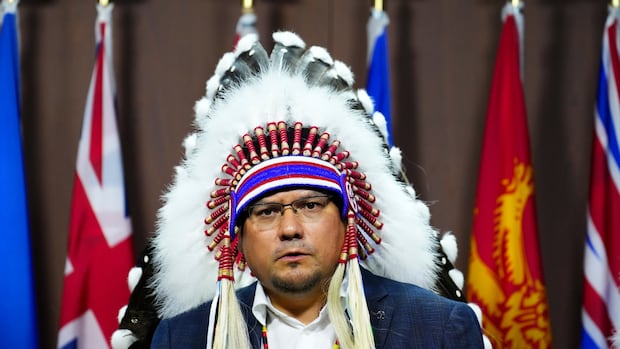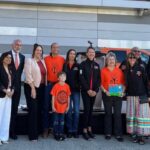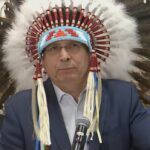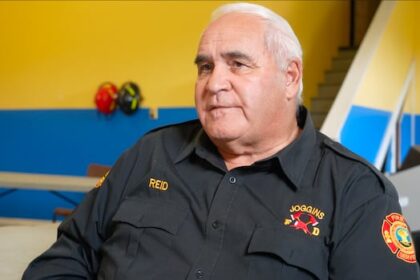IndigenousFirst Nations leaders in Manitoba say they don’t feel represented on the Indigenous Advisory Council tasked with advising Prime Minister Mark Carney’s new Major Projects Office.National chief says AFN was not consulted over selection of council membersAFN Regional Chief for Manitoba Willie Moore speaks during a news conference on Parliament Hill in Ottawa on Tuesday. (Sean Kilpatrick/The Canadian Press)First Nations leaders in Manitoba say they don’t feel represented on the Indigenous Advisory Council tasked with advising Prime Minister Mark Carney’s new Major Projects Office.Willie Moore, Assembly of First Nations (AFN) regional chief for Manitoba, said at a news conference Tuesday in Ottawa that Canada cannot decide who speaks for First Nations in Manitoba, “that authority rests with our nations.” “The Major Projects Office and Indigenous Advisory Council must be co-developed with the First Nations in Manitoba, must recognize our jurisdiction, uphold our treaties and prioritize First Nations-led infrastructure,” Moore said.At the news conference, AFN National Chief Cindy Woodhouse Nepinak said the organization was not consulted about the selection of members for the council. “The federal government should have taken more time to go across the country and hear people’s views on who’s there, who’s to sit around that table,” Woodhouse Nepinak said, adding she is happy for the First Nations members chosen.The Indigenous Advisory Council members were announced by Carney last week. The council is to help guide the work of the Major Projects Office, meant to facilitate fast tracking of major nation-building projects as part of Building Canada Act, or Bill C-5. The 11-member council has seven First Nations members, two Inuit and two Métis.The legislation is one part of Canada’s plan to respond to U.S. President Donald Trump’s tariff war and passed through Parliament in June.The advisory council comes after heavy opposition to Bill C–5 by many Indigenous leaders concerned it did not provide adequate protection for Indigenous Peoples’ right to consultation on projects impacting their land and communities.Carney held summits with First Nations, Métis and Inuit leaders in the summer, however some First Nations leaders expressed having more concerns following his meeting with them.Assembly of First Nations (AFN) National Chief Cindy Woodhouse Nepinak, left, and Willie Moore, regional chief for Manitoba, hold a news conference on Parliament Hill in Ottawa on Tuesday. (Sean Kilpatrick/The Canadian Press)Woodhouse Nepinak told reporters the organization was not informed by the federal government on the selection process or given the opportunity to provide input into the council or recommend members.She said AFN did not recommend anyone for appointment to the council to be respectful of First Nations rights holders. Woodhouse Nepinak said the AFN had a conversation with the Carney government only about a week before the council’s announcement.”If you’re going to have boards that are focused on Indigenous affairs or issues, they need to be the majority First Nations, because we’re the biggest population in this country and we’re diverse,” she said.Pierre Cuguen, spokesperson for the Privy Council Office, wrote in a statement to CBC Indigenous that the members of the council were selected for their “expertise in areas such as major projects, economic development, Indigenous rights, and regulatory processes.” The federal government did not respond to questions on whether it reached out to Indigenous organizations about the selection process for the council by the time of publishing.Names recommended by ITK, MMFInuit Tapiriit Kanatami told CBC News it recommended names for the council and Manitoba Métis Federation (MMF) President David Chartrand said he lobbied for MMF member Lorne Pelletier, who was selected.Chartrand said he thought Canada had a challenge selecting members for the council because of the vast number of Indigenous communities across Canada and the need to balance everyone’s interests. In a statement last Friday, the Summit of Treaty 5 Sovereign Nations said it had “serious concerns” over the decision to include the Manitoba Métis Federation in the advisory council without Treaty 5’s consent. Treaty 5 covers central and northern Manitoba, and small parts of Saskatchewan and Ontario. Sheldon Kent, chief of Black River First Nation and Summit of Treaty 5 Sovereign Nations co-chair, told CBC News they did not receive any formal request from the government to recommend names to the council and said they are concerned about a “pan-Indigenous” approach.”Not to have a seat on that advisory, it’s very concerning for us because whose land is it?” Kent said.”They want to do economic development mass projects without us being at the table, without consultation with us, without accommodating us.”Manitoba Métis Federation president David Chartrand speaks during a news conference ahead of a Bill C-5 summit in Ottawa, on Aug. 6. (Spencer Colby/The Canadian Press)Chartrand called the dispute over Manitoba representation in the council political and said MMF would have been “very happy that we have a Manitoba Indigenous voice in there.””We’re against a potential economic crash in our country and if we don’t start setting aside any emotions or political indifferences or personal views that, you know, cannot unite us, in fact divide us, then you’re in the wrong business,” he said.Indigenous Advisory Council member JP Gladu, from Bingwi Neyaashi Anishinaabek in Ontario, said the council has the difficult task of balancing the needs of communities with each project on a case-by-case basis.”We’re all going to have our war wounds, if you will, but we’re also going to have those badges of success, and we’re going to bring all that experience to the table and shed light,” he said.Gladu said he was asked by the Privy Council Office about a week before the council’s announcement about the position.In response to criticism over the council’s selection, Gladu said everyone is coming in with a vast amount of national and international experience and all members will have to remain cognizant of “all of our nations across the country.””We’re trying to do our best for our communities, and that’s what I’m trying to do,” he said.ABOUT THE AUTHORJoy SpearChief-Morris is the recipient of the 2025 CJF-CBC Indigenous Journalism Fellowship. She is an Indigenous Black journalist and member of the Kainai Blood Tribe in Alberta. Joy has had bylines in The Globe and Mail, The Narwhal, The Walrus, The Toronto Star, CBC and Sportsnet.
Thursday, 5 Feb 2026
Canada – The Illusion
Search
Have an existing account?
Sign In
© 2022 Foxiz News Network. Ruby Design Company. All Rights Reserved.
You May also Like
- More News:
- history
- Standing Bear Network
- John Gonzalez
- ᐊᔭᐦᑊ ayahp — It happened
- Creation
- Beneath the Water
- Olympic gold medal
- Jim Thorpe
- type O blood
- the bringer of life
- Raven
- Wás’agi
- NoiseCat
- 'Sugarcane'
- The rivers still sing
- ᑲᓂᐸᐏᐟ ᒪᐢᑿ
- ᐅᑳᐤ okâw — We remember
- ᐊᓂᓈᐯᐃᐧᐣ aninâpêwin — Truth
- This is what it means to be human.
- Nokoma











